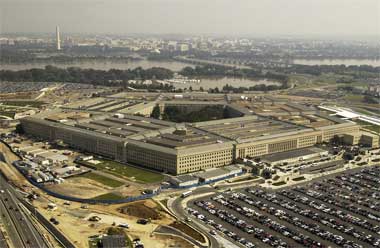Sequestration will devastate every aspect of Defense Department spending, from fighting the war in Afghanistan and supporting troop health and morale to training, maintenance and modernization, and carrying out the defense strategic guidance, Pentagon Comptroller Robert F. Hale said today.
Sequestration refers to a mechanism in the Budget Control Act that would trigger an additional $500 billion across-the-board defense spending cut over the next decade, in addition to $487 billion in cuts already programmed, unless Congress identifies equivalent savings by January.
Testifying before the House Armed Services Committee, Hale said the only way to avoid bad consequences is for Congress to enact a balanced deficit-reduction plan that the president can sign, a move that would halt sequestration.
“If that action is not taken,” the comptroller said, “we’re faced with the dollar consequences that the Sequestration Transparency Act report spells out.” The Office of Management and Budget last week released a report required by the 2012 Sequestration Transparency Act. The document details the financial effects of sequestration.
At today’s hearing, Hale offered the panel a high-level assessment of sequestration’s impact on DOD.
“Cuts in the national defense function will total $54.7 billion in discretionary and direct spending in fiscal 2013 under the assumptions of [the OMB] report. Of this amount, $52.3 billion would come out of the DOD budget,” the comptroller said.
President Barack Obama exercised his authority to exempt military personnel spending from sequestration, Hale said, but each nonexempt budget account will take a hit of 9.4 percent.
Funding for overseas contingency operations will be subject to sequestration, he said.
“We will protect wartime operating budgets to the extent that we can — support of our warfighters is our highest priority,” Hale said. “But that will mean greater cuts in the base budget portions, especially of the operations and maintenance accounts, and particularly in the Army and the Marine Corps.”
Such cuts would mean reductions in training, which “would affect our ability to respond to a new warfighting contingency should one occur,” the comptroller added.
Sequestration almost certainly would force DOD to reduce spending for civilian personnel, leading to hiring freezes and probably unpaid furloughs, he said, affecting weapons maintenance, contracting, and financial management and audit efforts.
A sequester also would substantially affect DOD investment programs, Hale added.
“While there’d be no impact on prior-year funds already obligated on contracts — and that’s an important point — there would nonetheless be substantial adverse effects,” he said, adding that the 9.4 percent cut would affect each of the budget accounts that fund procurement, military construction, and research, development, test and evaluation.
Sequestration would adversely affect military retirees and families, he said, and cause cuts in family housing maintenance and base operating support.
“We’d try to protect families wherever we can,” Hale added, “but we would have to make some of these cuts.”
Cuts would also be required in the Defense Health Program, including TRICARE, he said.
“These are the consequences that would come into play in fiscal 2013,” the comptroller said, noting that the sequestration law that would go into effect on Jan. 2 also would reduce DOD budgets by $50 billion to $55 billion in each year from fiscal 2013 to fiscal 2021.
This would double reductions already imposed by the Budget Control Act and accounted for by DOD, forcing the department to make substantial reductions in military personnel and units and giving the department fewer options for responding quickly to emerging crises, Hale said.
Hale was joined at the hearing by Gen. Lloyd J. Austin III, Army vice chief of staff; Adm. Mark E. Ferguson III, vice chief of naval operations; Gen. Larry O. Spencer, Air Force vice chief of staff; and Gen. Joseph F. Dunford Jr., Marine Corps assistant commandant.
Without exception, the military leaders said the results of sequestration would keep their forces from properly executing requirements of the new defense strategy.
Austin said the cuts required by sequestration would “adversely affect just about every aspect of our Army,” including that service’s readiness and its ability to respond to contingencies.
For the Navy, Ferguson said sequestration would translate over time to a smaller force with less presence, longer response times and reduced ability to provide surge forces in support of major operational plans and other emerging needs.
“This month I visited the Central Command region,” the admiral told the panel. He visited both aircraft carriers in the region, the USS Enterprise and the USS Dwight D. Eisenhower, along with the minesweeper force, patrol craft and other ships. In the process he said he spoke with more than 10,000 forward-deployed sailors.
“At every forum,” Ferguson said, “sailors from the most junior to our operational commanders expressed concern regarding what sequestration will mean to our Navy and their service. The uncertainty of our fiscal future is increasingly on the minds of our force.”
Representing the Air Force, Spencer said sequestration would “affect our ability to fulfill current wartime deployments, operational requirements and defense of the homeland, but it would also significantly impact our ability to prepare for future operations and … make investments in modernization.”
Such cuts would also impact the future of vital aerospace technology, the general said, “one of our key competitive advantages.”
For the Marine Corps, Dunford said sequestration would have “a chaotic effect on the force during a time of extraordinary challenges to our nation.”
For the last 10 years, the nation’s Marines, soldiers, sailors and airmen have done everything asked of them, he told the panel.
“The competence, responsiveness and flexibility of our force was seen again last week when Marines responded within hours to reinforce [U.S.] embassies in the Middle East and North Africa,” the general said, adding that such a response has occurred so often over the past few years that it might be taken for granted.
Most of the young men and women in uniform, like those who are part of the Fleet Antiterrorism Support Teams that deployed last week, or those in Afghanistan, are too busy doing their jobs to worry about the details of how the nation’s leaders and legislators develop and pass budgets, he said.
“Frankly, given all they do for us, they have a right to expect that whatever it is we’re supposed to be doing to properly support them, that we’re actually doing it,” Dunford said.
“One of my greatest concerns about sequestration … is that we will lose the trust and confidence of the all-volunteer force that we have worked so hard to build,” the general added.
Along with impacts on the budget and the defense strategy, sequestration also puts at risk “the intangible qualities that make our military the very best in the world,” he said.
“That fact needs to be a key part of the debate as we move forward,” the general added.











